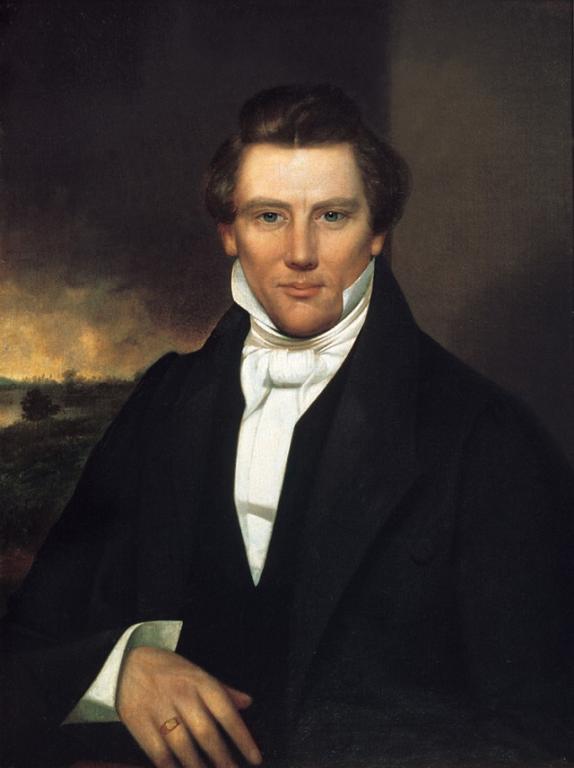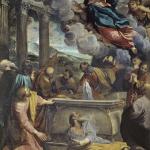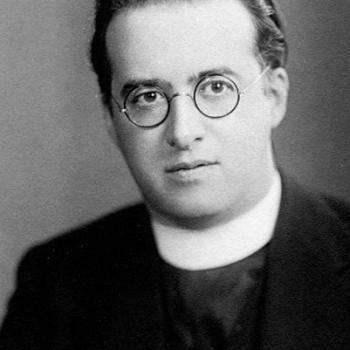
Very interesting discussion from one of my blog comboxes . . .
The words of “Ancalagon” will be in blue; those of “quantumleap42” in green, and Eoin Moloney’s in purple. I eventually chime in.
***
Don’t Mormons believe that the Gods are basically super-human beings, made of some kind of physical material? My understanding is that even the Mormon conception of the soul has it made of spiritually refined matter. So from a classical theist perspective, Mormon theology could be classified as both polytheistic and atheistic.
That’s a funny thing to say. I’ll add it as #5,234,432 to my list of weird things people say about Mormons. A wise Philosophy professor once told me that the only difference between a philosophical error and a joke, is that you laugh at a joke. And I’m all out of laughs.
From the perspective of someone who thinks the only thing one ought to worship is the First Cause of the universe, yes atheistic.
When someone says that a religion is both polytheistic and atheistic a natural response should be, “That’s a funny joke.” And laugh about it, much in the same way we laugh at “Who’s on First” by Abbott and Costello. Except, they were serious about thinking that Mormons are both polytheistic and atheistic. It’s a patently ludicrous statement, except no one laughed. So if it’s not a joke, how else are you supposed to respond?
Depends. Some people think that merely calling yourself “Christian” is enough to make you Christian, but that seems incoherent to me. And it should, at the very least, be very clear to anyone who cares to look that Mormonism is very different from historical Christianity, which seems to me to disqualify it from the title “Christian”.
He’s not actually wrong, even if he is speaking in an unusual way. He means “polytheistic” in the sense that they believe in multiple powerful entities, but “atheistic” in the sense that they do not seem to believe in worshipping the First Cause of the universe, the Unchanged Changer – in other words, they do not believe in any God that is not a super-powered creature. Popular presentations of God the Father often portray Him as if he were a powerful creature, but this is not so. Super-powered creatures would not actually be of a different kind of being than, say, Superman, or the Greek “gods”.
Exactly. It’s a denial of monotheism and God’s transcendence. Without an eternal God Who is spirit, it reduces to materialism, and arguably a sort (albeit a very weird sort) of atheism.
I think I made it pretty clear what my theological presuppositions are, ones I share with Dave Armstrong. So from that perspective I’m right to say Mormon theology is both polytheistic and atheistic.
That said, it is a pretty funny statement. I didn’t write the joke, the credit for that goes to Joseph Smith, Brigham Young, Orson Pratt, etc etc.
Mormon cosmology is bizarre but fascinating in its own way.
It depends on what level of analysis you choose and what theological presuppositions you bring to bear. Remember, I’m assuming a certain worldview (classical theism) to be true and looking at Mormonism etc. through that lens.
So a cosmology that admits of super-powerful creatures called gods, who are at the same time derived from ordinary lifeforms, and a materialist conception of the soul, could be consistent with the kind of atheism that rejects a transcendent creator God who is outside the universe, immaterial, omniscient, etc. From an atheist’s perspective people who worship Mormon gods would simply be worshipping creatures like humans albeit highly advanced creatures.
So let’s get exact. The statement I found patently ludicrous was that Mormons are both polytheistic and atheistic. By definition, those two things are mutually exclusive. Furthermore, it goes against the definition of the word “atheistic” to define a religion as “atheistic”. To make that assertion is to either intentionally ignore what it means to be an atheist, or to not understand what it means to be an atheist.
To twist the definition of the word “atheistic” in that way is to render it useless. Effectively Ancalagon was saying that he could make the word atheistic mean whatever he wanted it to mean. That action kills rational argument. If you can redefine words to mean the exact opposite of their definition, then there is no chance for a rational discussion.
If there is no chance for a rational discussion then I guess humor is one possible response, which is the response that I chose.
I have addressed your objection to my word choice. You’re free to tell me where I err.
A cosmology that admits of super-powerful creatures called gods, who are at the same time derived from ordinary lifeforms, and a materialist conception of the soul, could be consistent with the kind of atheism that rejects a transcendent creator God who is outside the universe, immaterial, omniscient, etc. From an atheist’s perspective people who worship Mormon gods would simply be worshipping creatures like humans albeit highly advanced creatures.”
Again, I’m using the language of “atheism” and “polytheism” within a specific context.
Remember, Socrates is sometimes said to have been charged with “atheism” (really, impiety) for rejecting the Athenian gods; he did not, however, reject the concept of “deity”in the abstract.
And you continue to insist that Mormons can be both polytheists and atheists. You surprise me, Ancalagon. What is your object in saying that? Do you suggest that Mormons can believe in a God (or even gods), while at the same time not believing in a God, or gods? As to how someone can be both polytheistic and atheistic is rather puzzling. You seem to be composing a puzzle to test whether people will recognize that you are joking and contradicting yourself. This seems to be the conduct of a jester.
Can you have people who are not people? Or horses that are not horses? Or flute players that are not flute players? Can you believe in a God and not believe in a God?
The definition of the word atheist is not, “Has a different view of God than me.” or even, “Their concept of God is so different from mine that I would not worship that God.” For every word there is certain vagueness to its definition, because that is the nature of language. But to use a word in direct opposition to its common meaning is to render it meaningless. You may as well say that Mormons are both “grimlocs” and “penduits”. Neither of which has any meaning.
It should be noted that Socrates’ response to Meletus on the charge of being an atheist is perhaps relevant here. I like how you compare me to Socrates. It makes me feel warm and fuzzy. You may not want to be so quick to take on the role of Meletus. Try 26c-27e.
If a cult arose that worshipped horses, because the members really loved horses, and perhaps even attributed various wonderful properties to them (such as the ability to gallop faster than any man could run, and pull much greater weight than any man could pull) their hippolatry would be consistent with an atheistic universe where no Gods exist. The hippolators would simply be animal worshippers. An atheist would condemn them, rightly consider them delusional, but he would still acknowledge the existence of horses. An actual God may or may not exist in this hypothetical world; what is relevant is that disbelief in God and belief in horses is not a contradictory position.
For someone with my theological presuppositions, Mormon gods are consistent with a totally material atheistic universe.
Yes they are, because the Mormons have ditched the transcendence of God, which means that they have ditched God, because that is part of His essence. A “god” who was once a man and a man that can become a god, is a race of “god-men” with no God (in the Christian definition). Therefore, it is simultaneously atheistic and polytheism. The Christian regards the gods of polytheism as non-existent; therefore, believers in them (in fact / in a sense / from our perspective) to be atheists, till they accept the one true (monotheistic / transcendent) God.
Do you suggest that Mormons can believe in a God (or even gods), while at the same time not believing in a God, or gods?
You fundamentally miss the point. We’re not saying that Mormons simultaneously believe one thing and the other, which are contradictory, and hence, self-consciously absurd. We agree that that would be the case, but (unfortunately for your “case”) it’s not what we are arguing. We’re not arguing from their perspective, but from ours, as classical orthodox theists / Christians. This is what you don’t get, and so you have descended (wittingly or not) to sophistry, and your comments are where the humor and folly reside, because you don’t understand the opposing viewpoint (rule #1 in any good debate).
Ancalagon made this aspect clear several times, by using phrases such as “from a classical theist perspective, . . .” and “From the perspective of [believing in] the First Cause of the universe . . .” and “from that perspective” [i.e., classical theism] and “I’m assuming a certain worldview (classical theism) to be true and looking at Mormonism etc. through that lens” and “From an atheist’s perspective . . .” [stated twice] and “For someone with my theological presuppositions . . .” That’s seven times clarifying exactly what he meant, and from what perspective he was asserting it.
I have argued it more briefly from a little different angle, but still from the same presuppositions. Yet you continue to not grasp what we are contending. That’s what happens when people seem unable (or unwilling) to momentarily step out of their own presuppositional bubble, in order to understand another different opinion. The fish in the aquarium or the ocean doesn’t understand that there are worlds composed of other than a liquid environment.
***
Photo credit: Painting (unknown artist, c. 1842) of Joseph Smith, Jr. (1805-1844), founder (heresiarch) of the non-Christian sect of Mormonism [public domain / Wikimedia Commons]
***













